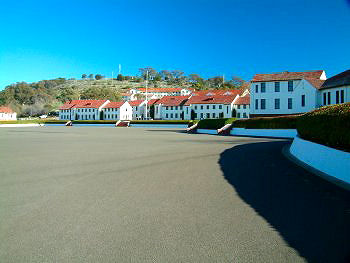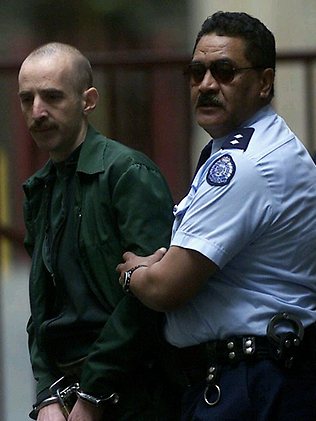RMC Duntroon officer training perpetuates a dangerous bullying culture
In 1987, I attended Duntroon as an Australian Army Officer Cadet.

Despite being a career goal, the experience quickly proved to be a total let down - expectations, standards, training, trust, propriety. I resigned in disgust five months in after being betrayed by my assigned mentor, a serving Captain, for some off the cuff criticism I had made.
After the five months I was more qualified to starch and iron greens and to polish boots than to fire a bloody SLR. I could iron a shirt faster than my mum - enemy look out!
I questioned field tactical decisions in training led by another captain in charge - (who was Duntroon qualified plus with a few years Infantry Corps experience - so he should have been a shining example). I recall after a training 'engagement' personally walking up to the mock enemy 'Majura Force' and asking their opinion of the engagement. They told me that their machine gunners would have easily mown most of us down even as soon as the captain's tactics had commenced. Great! School cadets had been more co-ordinated than this.
I recall a simulated combat wound training where we were demonstrated CPR. The Army trainers were crap. I had previously completed 8 years in Surf Life Saving to Advanced Resuscitation certification and had to show the trainers how CPR was done. Class theory training was rushed and superficial and many cadets fell asleep because they were only getting 5 hours sleep a night due to ironing and polishing their kit ready to shine for next morning parade. But ask most of them about the effective range of an SLR - no friggen idea!
What was the bloody point? I felt that if I had continued I would be eventually be a dead duck in combat. I resigned in disgust. I dismissed it as a 5 month camp and moved on. That was twenty five years ago.
I had an aviation cadetship on entry to Duntroon so I was in a rare training stream of 1 in 300 of the intake of January 1987 to enter the Army's Aviation Corp and to fly Blackhawks. I did not think this was special since I had previously invested $30,000 on helicopter training, so obviously my so-called 'aptitude' for flying was going to be half reasonable. If others had done similar, then they would have been too. But the crap at Duntroon was not worth it. I lost respect for the training, the NCO's, the officers, the commanders, the Army.
It was not the noble army that my father had served in as a NASHO.
One of the cadets in Kakoda Company that was assigned to my section was Julian Knight.
While I was slightly older (23) than the mean age and so slightly more mature, Julian was slightly younger (18) than the mean age and so slightly less mature, naturally. We were assigned into the same section - luck of the draw. There were just three of us in the section. I don't recall the third cadet's name (Chris?) but he was slightly older than me and married. Julian and I shared bush navigation exercises and on one particular field exercise the two of us shared a 'hoochie' (Army issue tent fly). As a team we were becoming quite proficient on exercise in our First Term. On 'Move Out', he would pack our sleeping bags, while I packed the hoochie and from being asleep to being mobile took us under 2 minutes. Julian was an excellent shot on the rifle range. I think I was barely adequate. In fact I recall two illegal discharges one involving a blank, and another when I fired a last round on the target range after not hearing the 'cease firing' command.
Back at Duntroon, we respectively had a score of boots and greens presentation 'show parade' penalties stacked against us - basically as punishment for not being up to scratch on substandard uniform presentation - for unrelated reasons. At the time I left, he and I shared the highest number of these 'show parades' for all Duntroon - I recall I had 21, he had amassed 26. It seemed par for the course.
Julian was a keen soldier, coming in with a background in the Reserves as a trooper. He displayed no fear when an assault was on. He was up the front. Perhaps he was an Albert Jacka VC in the making. Albert Jacka VC became a legend from Gallipoli and the Somme with a record of killing over 200 enemy - doing what he was trained for. [Read about Albert Jacka]
But Julian was abused from his early training. I believe because his immaturity and them misreading his keeness made him a target of the bullying culture at Duntroon. More than most cadets, he was ridiculed, harassed, persecuted, tormented and ostracised by the more senior cadets, and especially by the big and bulky Kakoda Company head cadet sergeant. This man took a personal dislike to Julian. One 2am occasion Julian had his room burst into and hosed down completely with a fire hose, then was inspected at 5am as part of drill. Kakoda Company had a reputation then as particularly more parochial and uncouth. It was ignored as being part of the training 'in this man's army'. Julian Knight probably copped more abuse than anyone else in that intake. In my book he was a victim of Defence Force abuse and bastardisation.
After I left in May 1987 and ultimately resigned from the Army in disgust in July 1987, I recall the next month in the national newspapers, Julian Knight was on the front page.
He had become the Hoddle Street mass murderer. The shootings resulted in the deaths of seven people, and serious injury to 19 others.
What had happened in the months May, June, July 1987 had obviously got worse for Julian, but I was not there. In some ways I had been his only true support but I should have done more. I had once spoken up in front of the entire complement of Kakoda Company after the CO had tokenly asked if any staff cadet had any concerns. It was dead silent, with everyone playing the obedient wall flower. But I spoke up. I complained to the CO in front of them all that in daytime theory classes many cadets were falling asleep because of the late night spit polishing and I asked what is the point? I got ostracised after that one. But it was the sought of standing up against the bastards that Julian and I celebrated.
Media reports tell of how he was expelled after a bar brawl in which he stabbed his key tormentor - the third term head cadet sergeant of Kakoda Company.
At the time I expected the media to be pursuing me for a story, since I automatically connected the massacre with his Duntroon persecution. But no-one ever contacted me. No-one ever connected his actions with his Duntroon torment.
It has taken me 25 years to be public about this.
I make no judgment about Julian. Each of us is capable of killing, killing animals, killing another human being. Rifles are very efficient at killing, that is what they are made for, to make the task easy. Armies exist to train those interested to kill. Duntroon is one such training establishment. The psychological tests to gain entry ask if one is prepared to kill and if one says no, then one is rejected as unsuitable. Controlled, just killing is sanctioned by governments in their armies and governments represent the will of their societies. What happens when a keen, capable soldier is abused by the Army, when this abuse involves repeatedly consistent ridicule, torment, intimidation and psychological torture? Well, like the reinforced intense training of a soldier to kill makes for a good solider, the reinforced intense abuse of a soldier to kill makes for a bad soldier. When frustration boils over into extreme anger mixed with depression and presented with an opportunity to get pay back (easy access to weapons), do you get 9th August 1987?
I do make a judgment about Duntroon. Incessant bullying of Julian was a key contributing factor that led to the Hoddle Street massacre.
I regret not having come forward before. What happened on Hoddle Street in August 1987 could have been avoided if Duntroon had not been a cultural incubator of bully boys in its officer training. I hold Duntroon culpable for the psychological state that it created in Julian. I only know Julian from my time with him doing basic training. He was someone you could trust in battle when the shit hit the fan. That attribute was never respected by the Duntroon establishment. They just kept picking on him and putting him down.
The place is a depraved throw back to the 19th Century. Duntroon breeds old school bully boys not deserving of officer status. It would be an excellent outsourced training ground for the Syrian Army. Is that what standard Australians expect of its Army leadership?
I read about ADFA today and I see that Australian Defence Force training culture has not changed.
Pity anyone not a bully boy enrolling, women especially.
Defence Minister Stephen Smith was right to take a moral stance against the injustice of the Army establishment, and haven't the old boys come out in closed ranks fighting!

Useful Reading:
Hoddle Street Massacre, 9th August 1987
ABC Radio National - Life Matters Programme: 'Lethality in Combat'> aired 5th March 2012.
'Lethality in Combat' by Military historian and formal naval officer Tom Lewis.

Recent comments